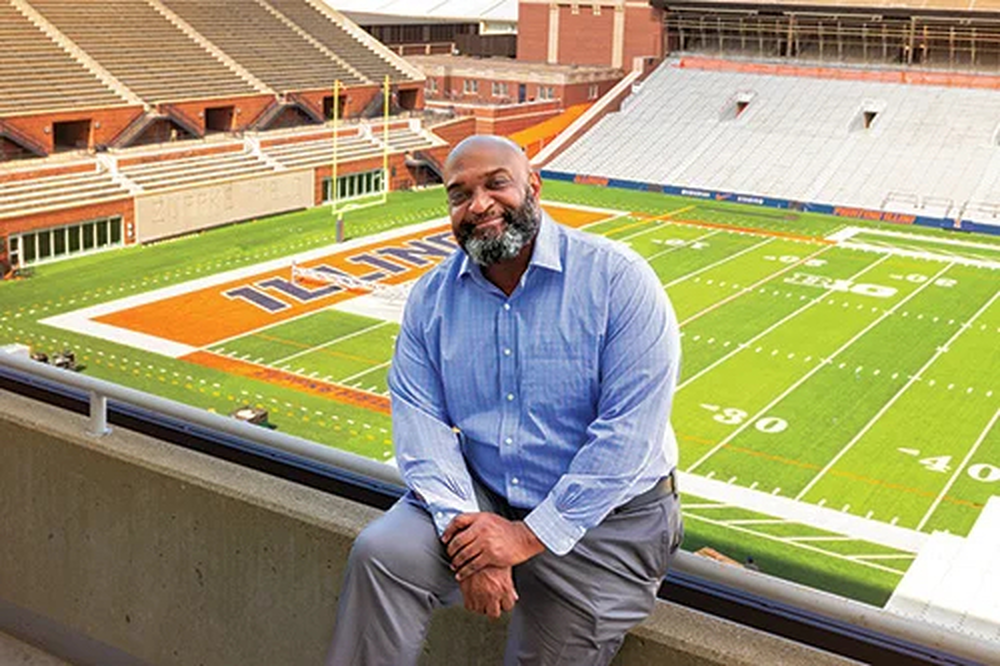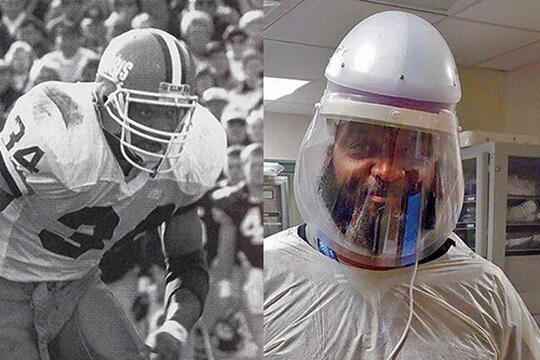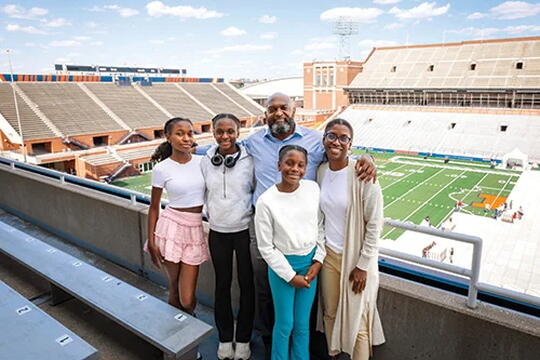
Kameno Bell knows that fumbling is inevitable — in football, and in life.
Bell (BS, ’92, biology; MD, ’01), a former fullback for the Fighting Illini, has excelled in the classroom and on the gridiron, playing two seasons of professional football for the Miami Dolphins before launching an ongoing career in emergency medicine. In recognition of his accomplishments, Bell was the invited speaker at the May 2024 School of Molecular & Cellular Biology convocation
The pipeline from professional athletics to medical school is as strenuous as it is uncommon. But from a young age, Bell’s aspirations were encouraged by his mother, a Jamaican immigrant who obtained two university degrees in adulthood.
“Family was always my primary driver in emphasizing the value of education,” Bell said. “My mom and stepdad made sure that education was always the top priority.”
As a high schooler in Chicago, Bell became interested in medicine while also being recruited to play football by Northwestern and the University of Illinois. His family had strong ties to the latter; his stepfather was captain of the Illinois track team in 1969 and remained a proud Varsity I alumnus.
In fall 1987, Bell joined Illinois as a biology major and a preferred walk-on for the football team.
“I knew I wanted to play collegiate sports while majoring in pre-med, but doing both was not a common achievement,” Bell said. “I had to use my own experience as encouragement to show other students that it was possible.”
Inspired by several professional football players who had transitioned to medical school, Bell was supported by the Illinois coaching staff and academic advisors, including Mike Hatfield, a now-retired academic counselor for the football and basketball programs.

“Mike was more than supportive; he offered any resources necessary to help me achieve my academic goals,” Bell said.
Bell played several games in his first season before redshirting the next to focus on his classes.
“The daily difficulty was time management and preparing my own meals, which was cheaper than going to the dining hall,” Bell said. “But learning that skill of time management was critical for my future.”
By his junior year, Bell had earned an athletic scholarship. He remained intent on going to medical school, but as he rushed and received for more than 1,100 yards during his senior season and was named the team’s most valuable player, a new opportunity arose: The NFL.
“Professional football was actually my Plan B, but it was an opportunity I couldn’t pass up,” Bell said. He loaded up on summer classes to complete his degree in time for training camp with the Miami Dolphins. Following two seasons in the NFL, Bell worked for a year as a substitute teacher for Chicago Public Schools while preparing to retake the Medical College Admission Test.
“I enjoyed working in the system I came from and being able to show kids who looked like me what was achievable,” he said.
Bell graduated from the University of Illinois Chicago College of Medicine and began a sports medicine fellowship at Indiana University. He was promptly recruited by former Illinois defensive line coach Denny Marcin — then a defensive line coach for the New York Giants — to intern with the Giants’ head physician. At the end of his fellowship, Bell was offered the head job. He’s been team physician for the Giants and an emergency medicine doctor at Hackensack University Medical Center since 2007.
“For the past 17 years, it has been Illinois connections shaping my trajectory,” Bell said.
Bell’s schedule can be erratic and uncertain, but he counts the rush of adrenaline, frequent surprises, and variety of cases as his favorite aspects of the job.
“Anything can come through the door,” he said. “You have to learn how to adjust.”
On the flip side, Bell, like emergency medicine providers across the country, contends with systemic problems like chronic overcrowding resulting from patients’ lack of access to primary care, rising healthcare costs, and science misinformation.
“A lot of patients came in (with COVID-19) because they didn’t believe in being vaccinated,” he said. “There were a lot of victims to disinformation, and I saw it firsthand.”

One constant in his career remained: family. Bell attributes his resiliency to a rock-solid support system, including his wife, Kenyanna, and their three daughters, Alyssa, Nia, and Maya Bell.
“I’ve struggled many times in academics, in sports, and in relationships,” Bell said. “But my parents were always there to provide support. And I try to impress upon my own kids that while I’m happy they’re doing well in school, I’m here to help when they’re not doing well.”
A quality Bell has noticed in every person he considers successful? The ability to move past failure.
“Disappointment is inevitable, but there is growth through failure,” he said. “Those that have done the best, handled failure the best.”
In other words: learn to recover the fumble.
Editor's note: This story first appeared in the Fall 2024 issue of The Quadrangle.
Main image by Carly Conway.